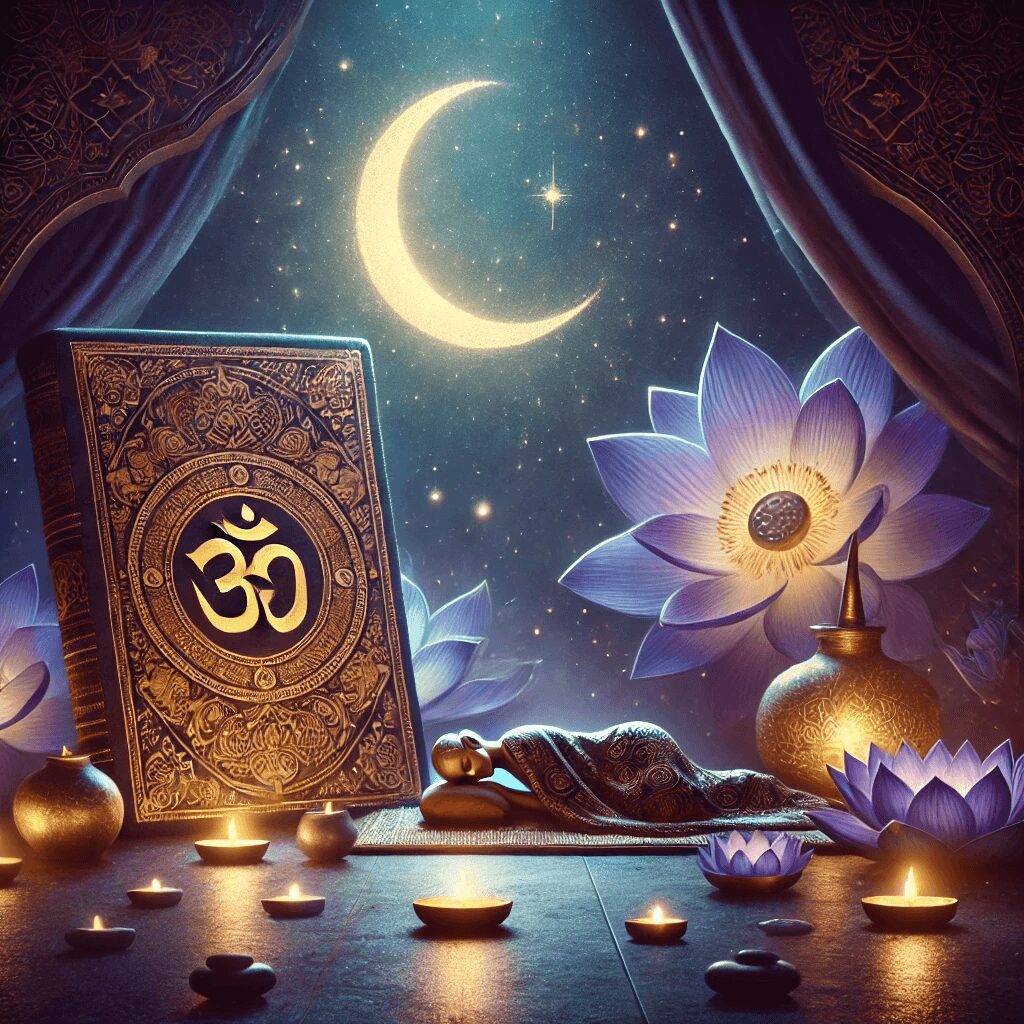Sleep and Rest
Unlocking Restful Nights: The Power of Ayurveda for Sleep and Rest
By Dennis Bluthardt at Namaste Studios
Sleep problems are a disease of modern culture that has taken root over the last few decades. The average person is not obtaining the quality of deep, restorative sleep they need for optimal health. Our increasingly stressed-out brains, eyes that are overstimulated by technology, and poor lifestyle habits have led to an insomnia epidemic. These real sleep concerns have driven the public to explore natural pills and technology options.
Ayurveda is an ancient Indian system of medicine that is an all-encompassing “How to live your yoga off the mat” kind of practice. It is a way of life that will give you divine sleep. Why? Because it’s a mind-body-spirit practice. Allopathic, Western sleep medicine acknowledges that most sleep problems that are not organic are, in fact, psychological.
Many factors cause sleep problems: coffee after noon, eating heavy and early dinners, working out late at night, not creating calming rituals before bed, and surrounding ourselves with too much agitation (looking at your iPhone and compulsive email checking!).
This is not an exhaustive list, but some of the more common herbs + supplements that have been discussed or are currently being studied are ashwagandha, Chamomile, valerian root, passionflower, theanine, tryptophan (converted in the body to 5-HTP), 5-HTP, GABA, and melatonin. (“Herbs + supplements” are the Author’s functional term for Ayurvedic “Herbs for Peace” + “Building Ojas” (Ojas are the body’s “vital essence”).
Many find incredible success in the natural sleep paths. A breathing tool and principle of Ayurveda, pranayama, may be a helpful sleep tool. Incorporating yoga and other Kundalini-based practices into your life can bring profound effects: waking up and falling asleep quickly, waking up refreshed and rejuvenated. Great sleep creates the stepping stone for a balanced body and energizes you.

Understanding Ayurveda and Its Approach to Sleep
Ayurveda, an ancient system of medicine that began in India, is based on achieving balance and harmony in the body, mind, and spirit. This approach will teach you the importance of balancing the three doshas, Vata, Pitta, and Kapha. Doshas are a type of energy or force, and all three are present in everyone, but each person is unique and has a different balance of the three doshas.
Ayurveda is a holistic approach in the complete sense of the word because its life includes the right food, lifestyle, and sleep.
In Ayurveda, sleep is also a diet because it is essential for rest and health. While sleeping, vital body rejuvenation, detoxification, organization, and healing processes occur. This is why sleep is so critical to your body. Lousy or inadequate sleep is a decisive reason for being sick in the long run because this causes imbalances in the body. These imbalances of the doshas in your body will then result in stress, restlessness, infertility, burnout, depression, being overweight, different types of aches, discomfort, and many other symptoms of an unhealthy life.
The right time to sleep is essential because Ayurveda recommends that you sleep harmoniously with nature and vibes. Based on how the universe is organized, every human body has an internal body clock that regulates body functions. Going to bed early and waking up with the sunrise is best because it is nature’s way. Proper sleep imbues your body with natural vibes, internal peace, good hormones, calm emotions, suitable organs, and good physical health. Your sleep will be better, and your next day will also be excellent.

The Importance of Sleep Quality
The quality of your sleep is determined by several things, including the length of time you sleep, how soon you fall asleep, and whether you experience all the restorative sleep cycles necessary for optimal health. If you’re like most people, you’ve experienced a lack of quality sleep at some point in your life and know all too well what it feels like to wake up with less than full energy and vitality. At the same time, you may have gotten used to not feeling 100 percent and are unaware that your present state of health is connected to the quality of your sleep.
In Ayurveda, the quality of your sleep is seen in how your body’s internal elements, doshas, are balanced or imbalanced. To find out what’s making you restless, perform the Vata self-test. Take the Pitta self-test to find out why you feel overheated at night. Do the Kapha self-test to find out why you typically go to sleep for too long.
Trying different herbs that enhance sleep before knowing which dosha is predominant will not likely give lasting results. Sleep quality is linked to all the other factors of your life, both external and internal, so the key here is following the clues that only you can provide yourself with.
Where you live has doshic components. When you wake up, what you eat and consume daily has doshic components. Are you single, partnered, or raising children? If you are single, vata predominates, and you will have more vata in your diet and lifestyle, too much in fact. When you get enough good quality sleep, your doshas are in balance, your body is healthy, you maintain high energy levels, and you are fueled differently by life experiences you feel are positive.
With self-knowledge on the side of doshas, you have the navigation tools to remedy and improve your health and future illness and disease patterns.

Ayurvedic Tips for Better Sleep
Consistent sleep schedules are critical for overall health. When you fall asleep and wake up simultaneously each day, your body can get into a better rhythm. This can result in higher-quality sleep and staying awake longer during the day.
Along with a more regular sleep schedule, techniques that promote relaxation will help you get better sleep quality. Many people find it helpful to do relaxing activities a few hours before they sleep to prepare their bodies for bed.

Natural Sleep Aids and Remedies
Several Ayurvedic herbs have been used for their relaxation and sleep-inducing qualities:
Ashwagandha, an adaptogenic herb, can help our bodies “adapt” to stress and anxiety to start to wind down.
Brahmi is another powerful herb widely used for its cognitive benefits. It also has an interesting calming effect on the mind, which can indirectly help you drift off to sleep.
Most widely known as a calming tea, Chamomile is used as a stack herb in several sleep supplements. Its calming effects are perfect for bedtime, so you’ll see it in many bedtime teas.
For people with insomnia, consider making a cup of “Ayurvedic tea” part of your nighttime routine: Combine equal parts Ashwagandha and Chamomile and add a pinch of Brahmi. Boil with hot water for around ten minutes, then enjoy! This stack should give you a potent but well-balanced relaxation effect, and it feels excellent to prepare/manually steep the tea. I’ll also add a few drops of honey for sweetness and its sleep-inducing qualities. This is an elemental Ayurvedic remedy for insomnia.
Limit caffeine and sugar closer to bedtime instead of choosing foods naturally high in sleep-inducing chemicals. For example, leafy greens and nuts are a great source of magnesium, which can help us relax our muscles and nerves to get to sleep. Give some of these tips a try and create a nighttime routine that combines a steady meditation regimen, a happy and positive lifestyle, and a diet optimized for rest! Start with small steps; over time, you can create more significant, holistic changes to how your body sleeps.

The Role of Rest in Ayurveda
Ayurvedic philosophy explains that sleep and rest are essential for rejuvenation, though they require entirely different states of consciousness. Sleep, or Nidra, is the natural state that your body enters generally every 24 hours, and the human body must function optimally. The role of sleep in physical health, cognitive function, mood regulation, and much more is so well-researched that we can all agree that it is very much necessary.
So, with rest, we want to achieve this same feeling while remaining wide awake. You can rest by relaxing your body and calming your mind; this does not have to look any way.
The Ayurvedic self-care practice of Abhyanga, and in general, using touch as a therapeutic method, has a powerful function in promoting rest and sleep. When you engage in self-massage, applying warm oil to your skin and rhythmically moving the oil on your body takes care of your skin and is a comforting way to soothe your nervous system. As you release tension from your body, increase circulation, and soothe your nervous system, you let energy (a.k.a Prana) flow. It feels like such a simple act, but it carries such a powerful sensation, you feel genuinely relaxed, and I’m going to say it, rejuvenated!
The key is that rest and sleep steadily maintain our state of health. Create a good daily routine and include self-care rituals like Abhangya to get proper rest and adequate sleep each day to feel your best. Create a sacred space for yourself and engage with yourself daily. Admire the beauty of your own body. Connect with her; she is very wise.
Knowing the difference is consequential. Along with learning how transformative practices such as Abhyanga can be for your well-being, you might reevaluate your daily schedule. You might even realize you’ve been getting less rest than you thought. That’s certainly what happened to me! Getting a good rest and sleep is twofold but equally beneficial to our personal care regimens. And that shift of perspective is more powerful than anything else.
Ayurveda, the Indian “science of life,” teaches that balance in all things is the key to vibrant health, including a balanced approach to sleep. In this holistic practice, genuine, lasting sleep is about much more than “how tired you are”; it taps into every aspect of your well-being, from spirituality to diet to physical fitness to emotional health.
In Ayurveda, you are recognized as being “ruled by the cosmos,” influenced by the five elements: Water, Earth, Fire, Air, and Ether (space). These elements, in turn, shape three main “doshas,” or constitutions. Helping to oxygenate the blood, balance hormones, regulate the core body temperature, and more, your dosha carb-loads your health on every level.
There are a myriad of ways that you can use the principles of Ayurveda to deepen your rest at night naturally. Look for:
Soothing essential oils like lavender
Hot, herbal teas
Calming yoga sequences: Perhaps you’ve heard of the Moon Salutation!
High-Zinc snacks
A gentle, loving self-massage
And more.
Each can help deepen your rest and even reduce the risk of insomnia.
To learn more, visit Ayurveda at Namaste Studios to book an Ayurveda session. Additionally, you can find more of our Ayurveda Blogs here.
For a Limited Time: Get your NEW MOON JOURNAL for a massive discount at Amazon here!
Bonus for blog readers: Watch how this Hybrid AI chatbot can save thousands of hours interacting with your clients. Click here for a FREE WEBINAR – It’s AMAZING!





